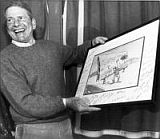 (Host) Vermont’s landmark billboard law changed the roadside view forever.
(Host) Vermont’s landmark billboard law changed the roadside view forever.
The law was largely the work of one man-Ted Riehle, who died on New Year’s Eve, just as the 40th anniversary year of his legacy was about to begin.
As VPR’s Lynne McCrea reports, the views we take for granted now were not a sure thing in 1968 when the idea was debated in the legislature.
(Highway sound in background)
(McCrea) Driving south on Interstate 89 in Richmond, a view appears around a bend. It’s an unobstructed panorama of gently sloping hills stretching into the distance.
(Bruhn) "We’re about to go down French Hill, which is one of the most beautiful views in Vermont, I think…
(McCrea) Paul Bruhn is Executive Director of the Preservation Trust of Vermont. He credits Ted Riehle – and the ban on billboards – for the unblemished view just ahead. Bruhn says it’s a view that Vermonters tend to take for granted.
(Bruhn) "…Camel’s Hump, in the distance… the wonderful steel truss bridge that crosses the Winooski in Richmond… it’s a very special panorama, and Ted’s foresight and tenacity in getting that bill passed is one of the great gifts that legislators have made to Vermonters."
(McCrea) By all accounts, getting the billboard legislation passed was no easy task. It was 1968. And there was deep opposition to the proposed ban, from businesses who relied on the advertising, and from farmers, who made money by leasing their land to billboard companies.
Ted Riehle, a former New Yorker and successful businessman, was in his third year in the Vermont legislature. He didn’t like the look of billboards, and he was determined to banish them from Vermont.
(Helen Riehle) I think he had a tremendously forceful personality, was extremely charming and engaging…
(McCrea) Helen Riehle is a daughter-in-law of Ted Riehle’s. She says the success of the billboard legislation was rooted in her father-in-law’s ability to win people over, one by one.
(Helen Riehle) "He started with the garden clubs…and went to, I guess, every garden club in the state, and generated that kind of support in the background, and grew it that way."
(McCrea) Phil Hoff, a Democrat, was governor when Ted Riehle started pushing for the billboard ban.
(Hoff) "He came from what I call the ‘liberal tradition of the Republican Party’. And he was very environmentally oriented…"
(McCrea) Hoff remembers some of the political positioning at the time. He says Riehle and the Republican leadership had decided to keep this legislation as their party’s own initiative-which he says angered many Democrats.
(Hoff) "Now they had an overwhelming majority of the members of the house, but even so, that angered a lot of Democrats who ordinarily would have been much in favor of this legislation."
(McCrea) In the end, Hoff says the bill ran into trouble when the House Republicans didn’t have the votes they needed.
(Hoff) "So they needed some help, which I provided, I must say with a little bit of resentment because they had been so adamant about this being their baby… Now, having said that, you have to give Ted Riehle real credit for this bill. It was a far reaching piece of legislation, very carefully thought through and crafted, and I think it served us very well…"
(McCrea) And so, in 1968, Vermont became the first state in the nation to have a total ban on billboards, one of only four states today. But after it was enacted, the billboard ban remained controversial in some circles in Vermont.
When Ted Riehle ran unsuccessfully for secretary of state, his son, Ted, was his driver for the campaign. Daughter-in-law Helen Riehle recalls that there were some tense moments on the campaign trail that year…
(Helen) "His father said ‘keep the car running (laughs) this might be a short visit’. So there were very strong feelings about it because it really was a very important source of income for some people and they had a hard time imagining living without it"…
(McCrea) Today, 40 years later, it might be hard to imagine Vermont with billboards. Paul Bruhn of the Preservation Trust says the absence of billboards sets the state apart…
(Bruhn) "You know, people come to Vermont and say, ‘hum… this is different here. Why is this place different?’ And a big piece of that is the billboard ban. But it’s also how we try to take care of the environment and be good stewards of the state."
(McCrea) After the billboard legislation passed, Ted Riehle went on to help establish "Green Up Day" in Vermont.
Ted Riehle died on New Year’s Eve, a week after turning 83 years old.
For VPR News, I’m Lynne McCrea.
(Host) There are photos of old Vermont billboards, from before the ban, on our website: vpr.net.
The family plans to hold a remembrance of Ted Riehle later in February.
PHOTO: Ted Riehle Jr. in 1988, celebrating the 20th anniversary of the ban on billboards in Vermont
Toby Talbot, AP file photo